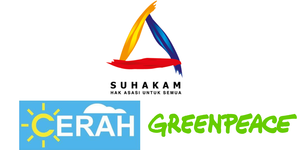
Addressing Haze Pollution in Malaysia
KUALA LUMPUR (11 MARCH 2022) – The prolonged impacts of haze pollution experienced especially over the last two decades have become a serious concern in the face of this devastating phenomenon that has affected the well-being of Malaysians and the economy.
As such, the Human Rights Commission of Malaysia (SUHAKAM), in collaboration with CERAH Anti-Haze Action Coalition, organised a Roundtable Discussion (RTD) to gather the diverse perspectives of subject matter experts, legal advisers, and key stakeholders in order to develop concrete plans to address the issue of domestic and transboundary haze pollution.
The RTD focused on highlighting the root causes of haze pollution from agricultural, land use change, peatlands and meteorological concerns, on its impacts on economic, health and environmental aspects. These provided the foundations for an in-depth study into fundamental gaps in existing Malaysian and regional legal frameworks that result in a lack of access to justice and information, public participation, and governance. The RTD promoted the protection of society’s human rights to a safe, clean, and healthy environment free of air pollution through a broad discourse on ideas for solutions.
SUHAKAM Commissioner Dato’ Mah Weng Kwai said:
“With the already present impacts of transboundary haze pollution affecting us all, made worse by the risks and dangers of climate change, the time to address the problem of haze is now, not tomorrow. It cannot be delayed any longer. Concerted efforts from all stakeholders are important especially from both Government and Non-Governmental parties. One cannot work without the other to solve this perennial problem.”
CERAH Anti-Haze Action spokesperson Azira Aziz said:
“Haze pollution is primarily a man-made problem resulting from haphazard land usage change and peatland drainage. Studies have indicated that the PM2.5 fine particles, largely found in haze, can lead to a large increase in death rates with long-term exposure, while the World Health Organization (WHO) estimates that air pollution causes 7 million premature deaths worldwide every year. We have a right to clean, haze-free air; and we must act NOW to stop the negative impacts of the haze on not only our health and economy, but also on climate change.”
Greenpeace Malaysia campaigner Heng Kiah Chun said:
“We must consider the harm that the increased air pollution will bring when we are still grappling with the Covid-19 pandemic and the economic devastation it has brought. Therefore, the government should enhance air quality governance, strengthen the recognition of environmental rights – that having a clean, healthy and sustainable environment is a human right – as has recently been done by the United Nations Human Rights Council.”
Global Environment Centre (GEC) Director Faizal Parish said:
“Most of the local and transboundary smoke haze in Malaysia comes from peatland fires. An increasing number of peat fires are taking place in Malaysia. We need to urgently revise our laws and regulations to force land managers to better protect peatlands, control drainage and prevent fires. We are way behind our neighbours like Indonesia that has had tough regulations for 5 years and is making good progress.”
Sahabat Alam Malaysia (SAM) senior researcher Shamila Ariffin said:“The fundamental root causes of the transboundary haze crisis must be addressed, differentiating the natural causes such as the El Nino phenomenon from those that are driven by human activities. The human driven activities such as the development and expansion of monoculture plantations on peat lands should not be allowed. By focusing on the enforcement of the correct preventive policy actions and regulations, including those on the protection of forests and land, and the promotion of sustainable finance, these fundamental root causes of the transboundary haze crisis can be resolved more effectively.”
The RTD is the outcome of a pioneering complaint filed at the Malaysian Human Rights Commission (SUHAKAM) on December 7, 2021, by a broad alliance of civil-society organisations which included Greenpeace Malaysia and CERAH, as a proactive countermeasure to address the chronic and persistent haze pollution.
The RTD focuses on providing findings and recommendations on the following:
- Strengthening the recognition of environmental rights in Malaysia
- Strengthening Malaysia’s air quality governance
- Strengthening governance of transboundary haze pollution
- Strengthening Business and Human Rights in Malaysia
It is hoped that the outcome of the RTD will fill in the gaps and challenges in realising the constitutional rights of a person to have a clean and safe environment.
-END-
This press release was prepared and endorsed by SUHAKAM and members of the Anti-Haze Action coalition which includes:
CERAH – Anti Haze Action
Greenpeace Malaysia
Sahabat Alam Malaysia (SAM)
Global Environment Centre (GEC)
Klima Action Malaysia (KAMY)
Pertubuhan Pelindung Khazanah Alam Malaysia (PEKA Malaysia) Suara Rakyat Malaysia (SUARAM)
Pertubuhan Alam Sekitar Sejahtera Malaysia (GRASS Malaysia) Environmental Protection Society Malaysia (EPSM)
Jaringan Ekologi Dan Iklim (JEDI)
Persatuan Pengundi Muda (Undi 18 – MyHutan)
Stop Open Burning in Johan Setia
Media contacts:
- Norashikin Hamzah, SUHAKAM | [email protected]
- Yvonne Nathan, Greenpeace Malaysia | [email protected]
